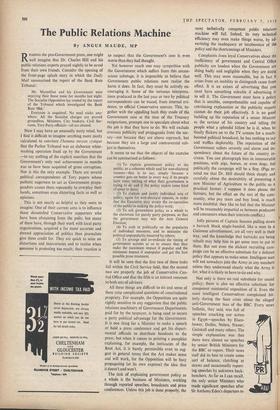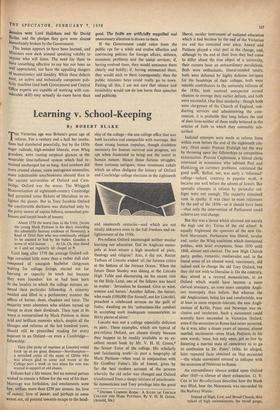The Public Relations Machine
By ANGUS MAUDE, MP RFADING the pro-Government press, one might well imagine that Dr. Charles Hill and his public relations experts prayed nightly to be saved from their own friends. Consider the opening of the front-page splash story in which the Daily Mail summarised the report of the Bank Rate Tribunal : Mr. Macmillan and his Government were enjoying their finest tonic for months last night. The Socialist Opposition lay routed by the report of the Tribunal which investigated the Bank Rate 'leak.'
Everyone is acquitted. No mud sticks any- where. All the Socialist charges are proved groundless. Ministers, City bankers, Civil Ser- vants, Tory Party officials—all are cleared.
Now I may have an unusually nasty mind, but I find it difficult to imagine anything more nicely calculated to convince l'homme moyen cynique that the Parker Tribunal was an elaborate white- washing operation fixed up by the Government —to say nothing of the explicit assertion that the Government's only real achievement in months was to have been acquitted of gross corruption. Nor is this the only example. There are several political correspondents of Tory papers whose pathetic eagerness to act as Government propa- gandists causes them repeatedly to overplay their hands, sometimes even distorting facts as well as opinions.
This is not nearly as helpful as they seem to imagine:One of their current aims is to influence those dissatisfied Conservative supporters who have been abstaining from the polls; but many of these have, through their work with local party organisations, acquired a far more accurate and shrewd appreciation of politics than journalists give them credit for. They are quick to seize on distortions and inaccuracies and to realise when someone is protesting too much; their reaction is to suspect that the Government's case is even worse than they had thought.
Yet however much one may sympathise with the Government which suffers from this uncon- scious sabotage, it is impossible to believe that Government public relations men realise the harm it does. In fact, they must be actively en- couraging it. Some of the tortuous interpreta- tions produced in the last year or two by political correspondents can be traced, from internal evi- dence, to official Conservative sources. This, to- gether with the appalling hash they made of the Government case at the time of the Treasury resignations, prompts one to speculate about what the job is that they have to do. We will exclude overseas publicity and propaganda from the sur- vey—not because they are above reproach, but because they are a large and controversial sub- ject in themselves.
It seems to me that the objects of the exercise can be summarised as follows :
(1) To explain government policy to the public, as a coherent whole and for non-electoral reasons—that is to say, simply because a country gets on better in every way if its people have some inkling of what their government is trying to do and if the policy makes some kind of sense to them; (2) To explain and justify individual acts of policy, again for non-electoral reasons, in order that the Executive may secure the co-operation of the public in making the policy work; (3) To sell government policy as a whole to the electorate for purely party purposes, so that the government may win the next General Election;
(4) To cash in politically on the popularity of individual measures, and to minimise the political unpopularity incurred by others;
(5) To arrange and co-ordinate the timing of government actions so as to ensure that they make the maximum impact if popular and the minimum impact if unpopular and get the best possible press treatment.
It will be seen that the first two of these tasks fall within the Civil Service field, that the second two are properly the jpb of Conservative Cen- tral Office and that the fifth is an interest common to both sets of advisers.
All these things are difficult to do and some of them raise complicated questions of constitutional propriety. For example, the Opposition are quite rightly sensitive to any suggestion that the public relations machinery of Government Departments, paid for by the taxpayer, is being used to secure a party political advantage for the Government. It is one thing for a Minister to make a speech or hold a press conference and get his depart- mental officials to distribute handouts to the press; but when it comes to printing a pamphlet explaining, for example, the intricacies of. the Rent Act, it is barely permissible even to sug- gest in general terms that the Act makes sense and will work, for the Opposition will be busy propagating (at its own expense) the idea that it doesn't and won't.
The task of explaining government policy as a whole is the business of Ministers, working through reported speeches, broadcasts and press conferences. Unless this job is done properly, the most technically competent public relations machine will fail. Indeed, its very technical efficiency may even make things worse, by ad- vertising the inadequacy or incoherence of the policy and the shortcomings of Ministers.
Complaints from loyal Conservatives about the inefficiency of government and Central Office publicity are loudest when the Government are doing badly and negligible when they are doing well. This may seem reasonable, but in fact it arises from an inability to distinguish cause from effect. It is an axiom of advertising that you must have something saleable if advertising is to sell it. The Government must have a policy that is sensible, comprehensible and capable of convincing explanation or the publicity experts cannot do their job effectively. It is no good building up the reputation of a senior Minister as the saviour of his country and telling the people what a splendid fellow he is if, when he finally flickers on to the TV screens for a much- boosted political broadcast, he has nothing to say and waffles deplorably. The reputation of the Government suffers severely and alarm and de- spondency about the future of the country in- crease. You can photograph him in innumerable positions, with pigs, horses, or even dogs, but politically the campaign will be a flop. (Pigs re- mind me that Dr. Hill should think deeply and carefully about the desirability of presenting a new Minister of Agriculture to the public as a practical farmer. I suppose it does please the farmers, but the effect on the rest of the com- munity, who pay taxes and buy food, is much more doubtful; they like to feel that the Minister will be reasonably impartial as between producers and consumers when their interests conflict.) Jolly pictures of Captain Soames pulling down a barrack block single-handed, like a man in a Guinness advertisement, are all very well in their way, and the knowledge that barracks are being rebuilt may help him to get some men to put in them. But not even the slickest recruiting cam- paign can be an effective substitute for a defence policy that appears to make sense. Intelligent men will not nowadays join the Army in any numbers unless they understand clearly what the Army is for, what it is likely to have to do and why. Jamaica were Lord Hai!sham and Sir David Eccles, and the pledges they gave were almost Immediately broken by the Government.
This lesson appears to have been learned, and Ministers now dash around speaking volubly to anyone who will listen. The need for them to have something effective to say has not been so well appreciated, nor have the appalling dangers of inconsistency and timidity. While these defects exist, an active and technically competent pub- licity machine (and both Government and Central Office experts are capable of working with con- siderable skill) may actually do more harm than good. The faults are artificially magnified and unnecessary attention is drawn to them.
If the Government could retire from the public eye for a while and evolve effective and convincing policies for foreign affairs, defence, economic problems and the social services; if, having evolved them, they would announce them clearly and boldly; if, having announced them, they would stick to them courageously; then the public relations boys could really go to town. Failing all this, I am not sure that silence and invisibility would not do less harm than speeches and publicity.



































 Previous page
Previous page